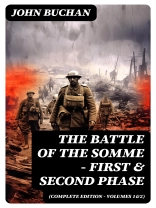In ‘The Battle of the Somme – First & Second Phase (Complete Edition – Volumes 1&2), ‘ John Buchan delivers a meticulously detailed account of one of World War I’s most consequential battles. With a compelling narrative style that seamlessly weaves historical analysis and personal accounts, Buchan captures the visceral realities of combat, the strategic imperatives driving military leaders, and the profound human cost of warfare. This complete edition provides a thorough examination of the tactical developments and political ramifications that emerged from the Somme, contextualizing the battle within the larger narrative of the Great War. John Buchan, a Scottish novelist and politician, was deeply influenced by his experiences as a military secretary during WWI, instilling in him a passion for documenting the realities of war. His literary pursuits were often interlaced with his fervent nationalism, making him an insightful commentator on the era’s social and political landscapes. Buchan’s background in both literature and history allowed him to approach his subject matter with a unique blend of scholarly rigor and narrative flair, making his work both informative and engaging. This book is highly recommended for readers seeking a comprehensive understanding of the Battle of the Somme, offering not just a military account but also a thoughtful exploration of the human experience amid conflict. Historians, military enthusiasts, and general readers alike will find Buchan’s insights invaluable in grasping the complex legacy of this pivotal event.
Sobre el autor
John Buchan, 1st Baron Tweedsmuir, was a Scottish novelist, historian, and politician who served as the Governor General of Canada from 1935 to 1940. Born on August 26, 1875, in Perth, Scotland, Buchan gained acclaim as a writer of adventure fiction and suspense, as well as a serious historian and biographer. His literary career spanned genres, but he is perhaps best known for his espionage thriller, ‘The Thirty-Nine Steps’, which has been adapted into various films and plays. Buchan’s works often reflect his own experiences and interests, including his involvement in politics, law, and historical research. In the context of his non-fiction contributions, ‘THE BATTLE OF THE SOMME – First & Second Phase (Complete Edition – Volumes 1&2)’ illustrates his dedication to historical accuracy and his ability to convey the enormity and significance of military history. Buchan’s literary style combines a deep understanding of character with a masterful command of narrative pace, making his historical works as engaging as his fiction. Elevated to the peerage in 1935, Buchan’s career as an author was marked by a prolific output and a knack for capturing the challenges and spirit of his time. He passed away on February 11, 1940, leaving behind a rich literary legacy that continues to be studied and enjoyed.












